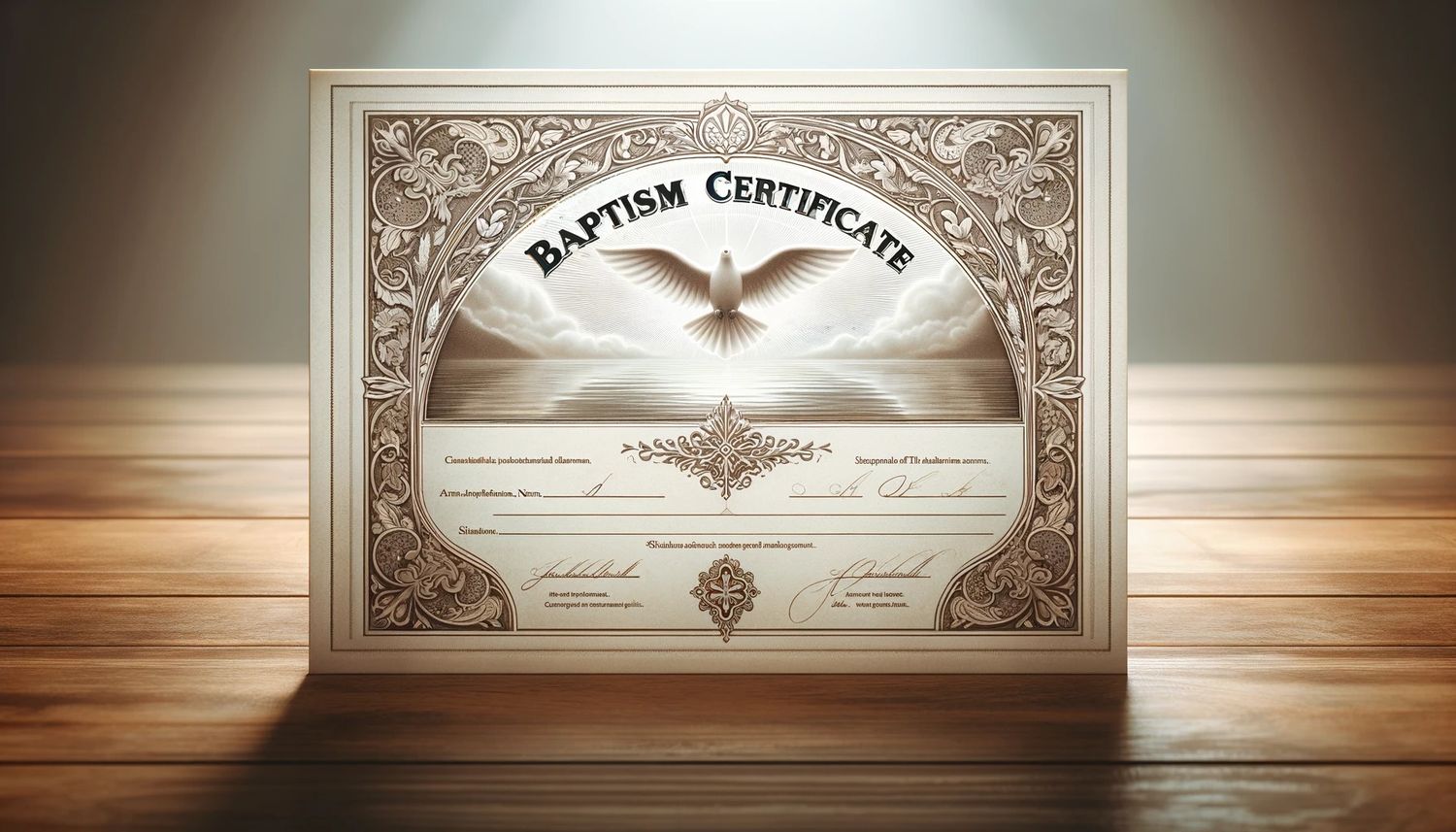Home>Theology and Spirituality>What Is A Baptism Certificate


Theology and Spirituality
What Is A Baptism Certificate
Published: February 26, 2024
Jason DeRose, Managing Editor at Christian.net, uses his expertise in religion and journalism to deepen understanding of faith's societal impacts. His editorial leadership, coupled with a strong academic background, enriches the platform’s diverse content, earning him recognition in both journalism and religious circles.
Learn about the significance and purpose of a baptism certificate in theology and spirituality. Understand its role in religious traditions and ceremonies.
(Many of the links in this article redirect to a specific reviewed product. Your purchase of these products through affiliate links helps to generate commission for Christian.net, at no extra cost. Learn more)
Table of Contents
Introduction
A baptism certificate is a significant document in the Christian faith, serving as a record of a person's baptism. It is a tangible symbol of the individual's initiation into the Christian community and their commitment to their faith. This certificate holds great value for both the individual and the church, as it signifies the beginning of their spiritual journey and their acceptance into the church family. In this article, we will explore the purpose, contents, importance, and uses of a baptism certificate, as well as how to obtain one.
Read more: What Is Baptism
Purpose of a Baptism Certificate
-
Documentation of Baptism: The primary purpose of a baptism certificate is to serve as an official record of an individual's baptism within the Christian faith. It acts as tangible evidence of the person's initiation into the church and their commitment to their religious beliefs.
-
Spiritual Milestone: A baptism certificate marks a significant spiritual milestone in an individual's life. It signifies their public declaration of faith and their decision to live according to the teachings of Christianity.
-
Recognition by the Church: The certificate is a means for the church to formally acknowledge and recognize the individual's baptism. It is a way for the church to affirm the person's inclusion in the community of believers.
-
Family and Personal Keepsake: For the individual and their family, the baptism certificate holds sentimental value. It serves as a cherished memento of the special day and the beginning of the person's journey of faith.
-
Legal and Administrative Purposes: In some cases, a baptism certificate may be required for legal or administrative purposes, such as for school registrations, marriage preparations, or other official documentation that requires proof of religious affiliation.
-
Symbol of Identity: The certificate also acts as a symbol of the individual's Christian identity. It can be displayed proudly in their home as a reminder of their commitment to their faith and their belonging to the Christian community.
-
Passing Down Tradition: In many families, baptism certificates are passed down through generations, carrying with them the legacy of faith and tradition. They serve as a link to the family's religious heritage and can be a source of inspiration for future generations.
Contents of a Baptism Certificate
-
Personal Information: The baptism certificate typically includes the individual's full name, date of birth, and the date of their baptism. This personal information serves to uniquely identify the individual and record the significant event of their baptism.
-
Church Details: The certificate also contains details about the church where the baptism took place, including the name of the church, its address, and the name of the officiating minister or priest. These details establish the official context of the baptism within the church community.
-
Godparents or Sponsors: In many cases, the names of the godparents or sponsors, who play a significant role in the baptism ceremony, are included on the certificate. This acknowledges their commitment to supporting the individual in their Christian journey.
-
Witnesses: The names of witnesses present at the baptism may also be recorded on the certificate. These witnesses attest to the authenticity of the baptism and provide additional validation of the event.
-
Scriptural References: Some baptism certificates may include references to specific biblical passages or verses that hold particular significance for the individual or were read during the baptism ceremony. These references serve as a spiritual connection to the Christian faith.
-
Seal or Emblem: A seal or emblem of the church or religious organization may be affixed to the certificate, signifying its authenticity and official recognition by the church community.
-
Date and Signatures: The date of the issuance of the certificate and the signatures of church officials or witnesses authenticate the document and establish its validity as an official record of the baptism.
-
Additional Notes or Prayers: Depending on the tradition or denomination, the certificate may include additional notes, prayers, or blessings, imparting spiritual significance and blessings to the individual as they begin their Christian journey.
The contents of a baptism certificate collectively form a comprehensive record of the individual's baptism, providing a tangible representation of their initiation into the Christian faith and their acceptance into the church community.
Importance of a Baptism Certificate
-
Spiritual Validation: A baptism certificate holds immense spiritual significance as it validates an individual's commitment to their faith and their acceptance into the Christian community. It serves as a tangible reminder of their spiritual rebirth and the beginning of their journey with God.
-
Historical Record: The certificate acts as a historical record of the individual's baptism, preserving the details of the significant event for future reference. It provides a link to the person's spiritual heritage and serves as a testament to their Christian identity.
-
Formal Recognition: Within the church, the baptism certificate is a form of formal recognition of the individual's initiation into the faith community. It acknowledges their participation in the sacrament of baptism and their inclusion in the body of believers.
-
Symbol of Faith: Possessing a baptism certificate symbolizes a person's faith and their public declaration of their beliefs. It stands as a testament to their decision to live according to the teachings of Christianity and serves as a source of spiritual encouragement.
-
Family Tradition: In many families, baptism certificates are cherished as part of a long-standing tradition. They are passed down through generations, connecting family members to their shared faith and serving as a reminder of their spiritual legacy.
-
Legal and Administrative Purposes: In addition to its spiritual significance, a baptism certificate may be required for various legal and administrative purposes. It can serve as proof of religious affiliation for matters such as school enrollment, marriage preparations, or other official documentation.
-
Connection to the Church: The certificate fosters a sense of connection to the church where the baptism took place. It serves as a link to the faith community and the spiritual family to which the individual belongs.
-
Personal and Emotional Value: Beyond its formal and legal importance, the baptism certificate holds personal and emotional value for the individual and their family. It represents a cherished memory and a significant milestone in their spiritual journey.
-
Continuation of Tradition: By possessing a baptism certificate, individuals continue the tradition of documenting and commemorating the sacrament of baptism, ensuring that the significance of this spiritual rite is upheld for future generations.
-
Confirmation of Identity: The certificate confirms the individual's identity as a member of the Christian faith, providing a sense of belonging and reinforcing their connection to the larger community of believers.
In summary, a baptism certificate holds multifaceted importance, encompassing spiritual, historical, familial, and legal significance. It serves as a tangible symbol of an individual's faith and their inclusion in the Christian community, carrying both personal and communal value.
How to Obtain a Baptism Certificate
-
Contact the Church: The most direct way to obtain a baptism certificate is to reach out to the church where the baptism took place. Contact the church office or the clergy responsible for maintaining baptism records. Provide them with the necessary details such as the full name of the baptized individual, the date of the baptism, and any other pertinent information to facilitate the search for the certificate.
-
Request in Person: If feasible, visit the church in person and speak with the church staff or clergy members. They can guide you through the process of obtaining the certificate and may provide immediate assistance in locating and issuing the document.
-
Provide Identification: In some cases, the church may require proof of identity or relationship to the baptized individual before releasing the certificate. Be prepared to present a valid form of identification and, if applicable, demonstrate your connection to the person for whom the certificate is being requested.
-
Fill Out Request Forms: The church may have specific request forms or applications for obtaining a baptism certificate. Fill out these forms accurately, providing all the required details to ensure the prompt and accurate processing of your request.
-
Be Patient and Follow Up: Depending on the church's administrative processes and the availability of records, obtaining a baptism certificate may take some time. Exercise patience and follow up with the church if necessary to inquire about the status of your request.
-
Consider Administrative Fees: While many churches provide baptism certificates free of charge, some may levy a nominal administrative fee for issuing the document. Inquire about any associated costs and be prepared to cover these expenses if applicable.
-
Alternative Contact Methods: If you are unable to visit the church in person, explore alternative methods of contact such as phone calls, emails, or online request forms if the church offers such options. Ensure that you provide all necessary details and follow any specific instructions provided by the church for requesting the certificate.
-
Verify Accuracy of Information: Once you receive the baptism certificate, carefully review the document to ensure that all the details, including the individual's name, date of baptism, and church information, are accurate and reflect the correct information. Notify the church promptly if any discrepancies are identified.
-
Maintain the Certificate Safely: Upon obtaining the baptism certificate, store it in a secure and accessible location. Consider making copies or digital scans for safekeeping, especially if the document holds sentimental or legal significance for the individual or their family.
-
Seek Assistance if Needed: If you encounter challenges or difficulties in obtaining the baptism certificate, do not hesitate to seek assistance from the church staff or clergy. They are there to support and guide you through the process, ensuring that you can obtain the certificate in a timely and efficient manner.
By following these steps and maintaining open communication with the church, individuals can successfully obtain a baptism certificate, preserving this important record of their spiritual journey within the Christian faith.
Read more: What Was The Baptism Of John For
Uses of a Baptism Certificate
-
Religious Ceremonies and Rites: The baptism certificate serves as a fundamental document for participating in subsequent religious ceremonies and rites within the Christian faith. It may be required for sacraments such as confirmation, marriage, or ordination, where proof of baptism is essential for the individual's continued engagement with the church.
-
Educational Enrollment: Many educational institutions, particularly those with religious affiliations, may request a baptism certificate as part of the enrollment process. It serves as evidence of the student's religious background and may be necessary for admission to schools with specific religious education programs.
-
Marriage Preparations: When individuals seek to marry within the church, a baptism certificate is often a prerequisite. It demonstrates their initiation into the Christian faith and their eligibility to partake in the sacrament of marriage within the church community.
-
Genealogical Research: Baptism certificates are valuable resources for genealogical research, providing vital information about an individual's religious heritage and family lineage. They serve as historical records that connect individuals to their ancestral roots and religious traditions.
-
Immigration and Citizenship: In some instances, a baptism certificate may be required as part of immigration or citizenship applications, particularly in countries where religious affiliation holds legal significance. It can serve as proof of the individual's ties to a specific religious community.
-
Personal Reflection and Renewal: For the baptized individual, the certificate holds personal significance as a tangible reminder of their commitment to their faith. It can serve as a source of personal reflection and renewal, reaffirming their spiritual journey and the vows made during their baptism.
-
Church Membership and Participation: Some churches may request a baptism certificate as part of the process for formal membership or active participation in church activities. It signifies the individual's foundational connection to the church and their commitment to the Christian community.
-
Legal and Notarial Purposes: In certain legal proceedings or notarial acts, a baptism certificate may be required to validate an individual's religious status or affiliation. It can be used to affirm the person's standing within the Christian faith for various legal matters.
-
Cultural and Traditional Celebrations: Within certain cultural or traditional contexts, the baptism certificate may be presented or referenced during milestone celebrations or religious observances. It holds cultural significance as a symbol of the individual's religious identity and heritage.
-
Heirloom and Family Legacy: Baptism certificates often become cherished heirlooms within families, passed down through generations as part of their religious and familial legacy. They hold sentimental value and serve as a link to the family's shared faith and traditions.
-
Spiritual Counseling and Guidance: In the context of spiritual counseling or guidance, the baptism certificate can provide insight into an individual's spiritual background and journey. It may be referenced in pastoral care settings to understand the person's religious foundation and experiences.
-
Community and Church Records: Baptism certificates contribute to the comprehensive records maintained by churches, documenting the spiritual milestones of their members. They serve as part of the church's historical and administrative archives, preserving the legacy of baptisms within the faith community.
In essence, the baptism certificate holds diverse and far-reaching uses, encompassing religious, educational, legal, cultural, and personal dimensions. Its significance extends beyond the individual, contributing to the collective heritage and traditions of the Christian faith.














